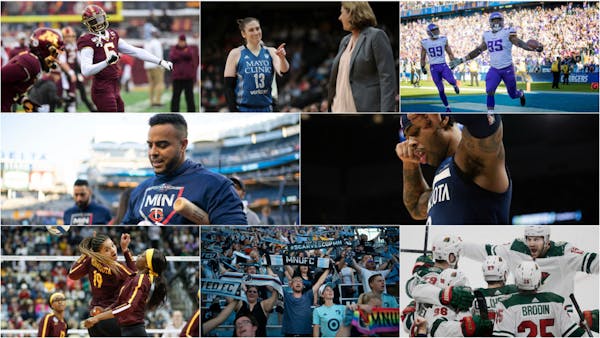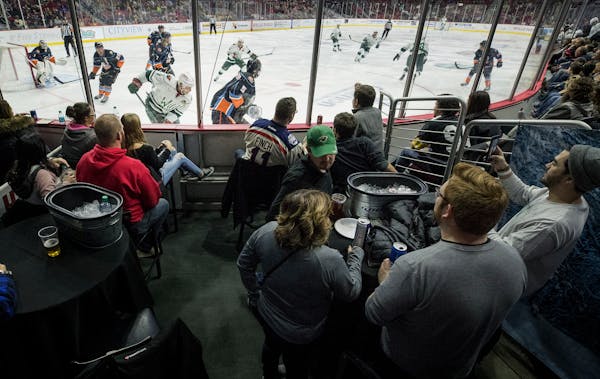In the classes he teaches at the University of Minnesota, sociology professor Douglas Hartmann will sometimes tell his students to imagine a world without sports.
But even in what Hartmann called a "crazy intellectual thought experiment," he never considered telling his students a scenario like the one playing out in real life: a pandemic wiping out months of sports.
"Nobody ever has imagined scenarios as drastic and total as we're going through right now …" Hartmann said. "The worst-case scenarios for the students, and probably for most of us, don't even approximate the absolute shutdown we're experiencing right now."
Hartmann said he does the exercise to ask students what values they get out of sports and how it frames their relationship with the world around them.
At some point in the future — perhaps in months, perhaps a year or more — it will be safe for fans to enter an arena or stadium again. It's likely that major pro sports will first resume without fans in attendance. And someday, a return to what we remember could be possible.
“I'm a passive aggressive Minnesotan, so I already prefer my fellow fans to keep some distance. I will say that if we're at a point where we're all healthy enough to attend sporting events together, we're healthy enough to high-five strangers.”
But what happens in the medium term? Later this year, next year or two years from now? How will fans' relationship with sports change, and will that change be temporary or permanent? Will their attitudes and behaviors simply revert to how they were?
"I believe fans have a real strong desire to re-engage with their hometown team," Twins President Dave St. Peter said. "I think two or three years from now, assuming a vaccine for this particular virus is in play, I'm pretty bullish that it can return to a normal setting."
Getting back in the game
St. Peter and his staff have talked about how different the ballpark experience might look when baseball does return to Target Field. How managing concessions is likely to change. Food may be more grab-and-go style instead of having someone assemble it in front of you, and how the team manages something as simple as a condiment stand is likely to change.
"Some of those things would be easy to do. Some would be hard to do and may need to take place over time," St. Peter said. "But that could be one of the longer-term outcomes of this. You might see more of that in all kinds of entertainment venues just because people are more sensitive to others touching their food or their containers."
This is a change that'd fans like Dan Atwood from Brooklyn Center would welcome. Atwood said he would like to see "no touch" hand sanitizer more readily available in arenas and stadiums.
"I can't tell you how many times I've been putting ketchup on a hot dog or some cheese curds and wished for a quick pump of hand sanitizer before eating after touching the ketchup dispenser," Atwood said. "Arena restrooms are notoriously dirty no matter how dedicated the custodial staff is, so a no-touch alternative that's available at the areas of the stadium that see the most physical contact would be helpful."
Changes like this are already in place for the independent St. Paul Saints, who announced last week procedures on what fans can expect when they return to the ballpark. The changes include having more hand sanitizer, getting rid of the do-it-yourself condiment stands and having cashless purchases, something St. Peter said could be coming to a lot more venues.
The aesthetic of going to a game may change. The food and beverage experience might be different. Workers may wear masks or gloves on a permanent basis. The behavior modifications Americans are undertaking could cause a permanent shift in attitudes and expectations as it relates to their interaction with ballpark or arena staff and their fellow fans.
What happens next?
That's if fans show up at all.
"I think you're going to see a lot of arenas and stadiums less than half full," said B.J. Schecter, a professor who teaches sports media at Seton Hall and formerly served as executive editor for Sports Illustrated. "I have two young boys and I've been in sports my whole life. I would have a lot of trepidation getting in those types of venues any time soon, even after we think we're out at the other end of this."
The only way, Schecter said, that the relationship between fans and sports returns to normal is with a vaccine, but a vaccine could be over a year away if and when it does arrive.
Even then, there promises to be certain psychological shifts in attitudes at sporting events, especially as it relates to interacting with other fans.
"You're sitting in a packed stadium and somebody three seats down gets into a coughing fit, what are you going to think?" Schecter said. " 'Oh my God, I've got to get away from this person. This person could be sick and could infect me and everybody around me.' We never really thought that way before. Yeah it was annoying on public transportation or airplane or a stadium. … Now it's, 'Is this person sick?' Psychologically that's a whole new thing."
Some fans, like Cory Engelhardt of West St. Paul, would be hesitant about physical interaction with other fans.
"It's sad, but the high-five or handshake might be a thing of the past," Engelhardt said. "At least with strangers. I don't see that changing in terms of my own family, but I don't know that I see a lot of people offering up a high-five or a handshake again any time soon."
Atwood said he wouldn't mind high-fives but hopes the pandemic will help maintain better overall hygiene, like covering coughs — and not being afraid to remind each other to do so.
“We understand that we many not be in a position if given the opportunity to sell every last ticket at Target Field. We may need to stop short of that and give people the opportunity to spread out.”
But even some of those who aren't big fans of people invading their personal space, like Matt Brandes of Minneapolis, are looking forward to celebrating with fellow fans again.
"I'm a passive aggressive Minnesotan, so I already prefer my fellow fans to keep some distance," Brandes said. "I will say that if we're at a point where we're all healthy enough to attend sporting events together, we're healthy enough to high-five strangers."
Looking forward
Hartmann and Schecter pointed to the terrorist attacks on Sept. 11, 2001, as shifting the landscape of sports in a permanent way. For instance, metal detectors weren't at every venue before that. They became a fact of life afterward.
"I think there are going to be differences and changes in protocol and attending games and so forth," Schecter said. "What exactly they're going to be, I'm not sure. But there are going to be differences."
Some of psychological effects of social distancing could become embedded in American culture and manifest themselves at sporting events.
"Over the longer term, I'm fairly optimistic that it will return to more of a normal, more of a traditional crowd," St. Peter said. "It doesn't mean that fans won't be a little more sensitive to shaking hands or high-fiving."
Hartmann said that relates to larger questions not just with how sports are changing, but how people think about themselves and others in relation to their own health.
"When I ask my students the kind of thought question about no sports, usually everybody imagines those first days after 9/11," Hartmann said. "It's nothing like what we're going through now, and it had major effects — major transformative effects — that moment in our history."
The economic impact is cutting across all levels of sports, from youth leagues up to pros.
The lack of crowds initially could put more importance on the broadcasting of sports, and with the NFL looking to ink new deals with networks, this could affect that price tag. If fans are reluctant to come to stadiums in the same numbers, perhaps more will be watching on television, even if the broadcast could be awkward without fan noise.
St. Peter is hoping the "pent-up" demand for people to watch sports will carry over once fans are allowed to congregate in stadiums again. He said he could envision a scenario when not every seat is sold at Target Field and fans are allowed in so long as they are sitting a certain distance apart from each other. That was part of the recent return-to-play plan released by the Saints.
"We understand that we many not be in a position if given the opportunity to sell every last ticket at Target Field," St. Peter said. "We may need to stop short of that and give people the opportunity to spread out."
But St. Peter sees sports at large having a big impact on bringing America back from the jolt the virus has caused. That's a sentiment NBA Commissioner Adam Silver said was prevalent during a recent virtual Board of Governors meeting.
"I think there's a recognition from them that this is bigger than our business," Silver said. "It's bigger than sports and there's great symbolism around sports in this country and to the extent we do find a path back, it'll be very meaningful for Americans."
That experience just might have a different look and feel to it, especially in person.
"I've been in sports almost 30 years, been to Final Fours, Super Bowls, Olympics — I never once for a second thought about a pandemic or a virus," Schecter said. "That's not an option anymore.
"Anytime anybody goes to anything with big crowds, this is going to be on people's minds."

Trail section at one of Minnesota's most iconic spots closing for rehab

Will 'shotgun only' zone for deer in southern Minnesota be abolished?

Four Minnesotans catch salmonella in outbreak linked to basil sold at Trader Joe's


